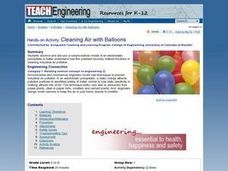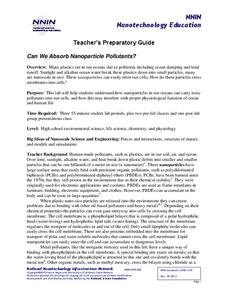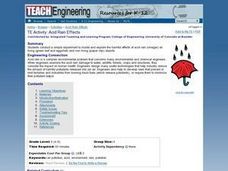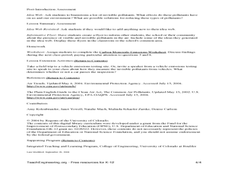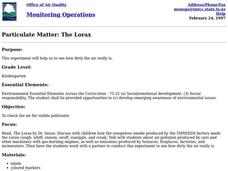National Library of Medicine
Your Environment, Your Health: Air Quality
Some scientists argue that air pollution now causes more deaths than smoking. The second unit in a six-part series focuses on air quality. Scholars learn what's in the air, how clean the air around their school is, and what they can do...
Teach Engineering
Combustion and Air Quality: Emissions Monitoring
Help your class determine the types of pollutants coming from vehicle exhaust. Groups use an air quality monitor to determine the emissions from different vehicles, to gain knowledge about combustion energy, and to predict how the...
Teach Engineering
Air Pollution in the Pacific Northwest
Scholars investigate levels of nitrogen dioxide in the Pacific Northwest by examining the role of nitrogen in air pollution and how remote sensing can be used to measure nitrogen levels. An Excel spreadsheet calculates the difference...
Baylor College
There's Something in the Air
Clever! In order to compare indoor and outdoor dispersal rates for the movement of gases and particles through air, collaborators will participate in a classroom experiment. Set up a circular grid and set students on lines that are...
Discovery Education
Fuss About Dust
Dust is everywhere around us; it's unavoidable. But what exactly is dust and are certain locations dustier than others? These are the questions students try to answer in an interesting scientific investigation. Working independently or...
Curated OER
The Air We Have Around Us
Students listen to story, The Lorax, by Dr. Seuss, discuss air quality and how people affect the earth and its atmospheric cycles, and give oral reports on what they have learned.
Center for Innovation
Air Pollution: What is the Solution?
For this air pollution worksheet, students use an online simulation called "Smog City" to manipulate different conditions that affect air pollution. Students answer questions about the health effects at peak ozone levels for different...
Curated OER
CO2 and Air Pollution
Seventh graders observe and test for the presence of carbon dioxide gas. They compare concentrations of carbon dioxide gas and conclude high concentrations of carbon dioxide gas are unhealthy for human beings.
Curated OER
Air Pollution and Asthma
Eleventh graders consider air quality. In this environmental stewardship instructional activity, 11th graders consider the impact of air pollution on asthma and identify ways that they can work to reduce air pollution.
Curated OER
What's Air Got to Do with It?
Students use M&M's to create a pie graph that expresses their understanding of the composition of air. They watch and conduct several simple experiments to develop an understanding of the properties of air (it has mass, it takes up...
Curated OER
Cleaning Air with Balloons
Students examine how a pollutant recovery method functions in cleaning industrial air pollution. They listen to a teacher-led discussion, conduct an experiment with balloons, static electricity, and pepper, and observe and record the...
Curated OER
Where, Oh Where is All the Clean Air?
Students examine the history of air pollution dating back to the Roman Empire. In groups, they research the different types of pollutants in the air and how they can affect the environment. They participate in various experiments to...
Curated OER
Catch the Pollution
Explore environmental care by conducting a pollution experiment. You'll discuss the causes of pollution in our environment and what the overall impact will be if we can't change our ways. Clear plastic tape, a can, and compass are used...
Curated OER
Air Quality and Transportation in the Tulsa Area
Students investigate the effects of air pollution. In this environmental instructional activity, students discuss the causes of air pollution and identify how transportation has an effect on the air quality. Students identify other...
Curated OER
Pollution in the Air and the Water Pollution Solution
Students explore air pollution. In this ecology and air pollution lesson, students perform an experiment in which a Vaseline coated lid is placed inside and outside the classroom. Students make predictions and then record what they see...
Curated OER
How Does the Air Get Polluted?
Students listen to or read a story that introduces awareness of environmental issues and in particular pollution.
National Nanotechnology Infrastructure Network
Can We Absorb Nanoparticle Pollutants?
Just because we can't see it doesn't mean it isn't there! A growing concern for environmental scientists is toxic nanoparticles in our air and water. Young scholars conduct an experiment to demonstrate how these particles can cross our...
Curated OER
Debate: "Indoor Air vs. Outdoor Air Pollution: Which Is the More Serious Threat to Public Health?"
High schoolers work in teams to synthesize their air, asthma, air contamination, and environmental health knowledge as well as additional research to represent a particular point of view persuasively. They create a handout and...
Curated OER
Acid Rain Effects
Get out the goggles and conduct a simple experiment to model and explore the harmful effects of acid rain (vinegar) on living (green leaf and eggshell) and non-living (paper clip) objects. Young chemists observe and describe the harmful...
Curated OER
Turning the Air Upside Down
Students analyze how engineers study temperature inversions and convection currents to understand why pollution levels may be higher in some areas than others. They participate in an experiment that allows them to build simple models to...
Curated OER
Air Pollution: Visible and Invisible
Fourth graders work together to complete an experiment on air pollution. They identify visible and invisible forms of pollution. They gather their data in notebooks and analyze their results to end the lesson plan.
Curated OER
I Don't Believe My Eyes!
Young scholars develop their understanding of the effects of invisible air pollutants. In this invisible air instructional activity, students complete experiments with a rubber band air test, a bean plant experiment and by exploring...
Curated OER
Particulate Matter: The Lorax
Students explore air pollution. In this ecology lesson, students participate in an experiment in which 5 numbered jar lids are placed outside. Students bring one lid a day in until all jars are inside. Dirt specks are counted, observed,...
Texas Commission on Environmental Quality
Environmental Sciences
Whether you are teaching environmental science in junior high or studying recycling in kindergarten, there is something for all in this set of lessons designed for environmental education. The 110-page packet comes with tips for...












